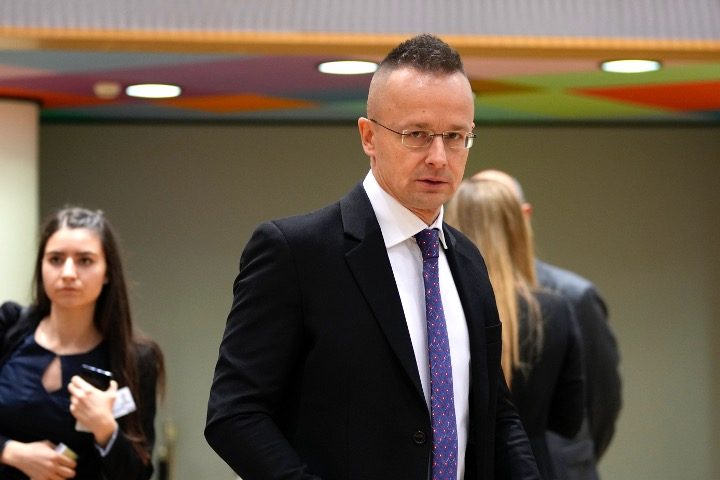
On January 23, Hungarian Foreign Minister Péter Szijjártó told a press conference in Brussels that he had received a death threat before an upcoming visit to Ukraine.
As per Hungarian media, the culprits pledged to give him an “explosive welcome.”
Szijjártó will travel to the city of Uzhgorod on January 29 to meet his Ukrainian counterpart, Dmitry Kuleba. Last week, the Hungarian diplomat said that he will take a “strong delegation” with him to discuss the plight of ethnic Hungarians in Uzhgorod and the surrounding region of Transcarpathia, whose language rights have been limited by Kyiv over the past ten years.
Speaking to reporters, Szijjártó revealed that a threatening message had been delivered to Hungary’s embassy in Ukraine on January 22.
Hungarian news site Index released the text of the message, which read:
Hungarians, we hate your government, which continues to do everything to make us lose the war. Do you think that your minister will just come to us after the attacks on Ukraine? We don’t think so. On January 29, [Szijjártó’s delegation] can expect an explosive welcome. An armored train will not save you. We recommend that you place an order with a funeral home so that they can start making the coffin for Szijjártó to fit his height. God forgives, but Ukrainians do not.
The message was written in Ukrainian and sent to the embassy via email, Index reported. Szijjártó said that whoever wrote the message did so “with the clear aim of casting a shadow over the meeting of foreign ministers next Monday and preventing it from taking place.”
The threat will not prevent Szijjártó from visiting Uzhgorod, Hungarian State Secretary for Foreign Affairs Tamás Menczer penned on social media on January 23.
“Those who think that the Hungarian foreign minister is scared, they don’t know Péter Szijjártó,” Menczer wrote. “Pressure and threats only make us stronger.”
Szijjártó and Hungarian Prime Minister Viktor Mihály Orbán have repeatedly urged for a ceasefire in Ukraine and peace talks between Moscow and Kyiv, with both men contending that Ukraine cannot possibly hope to win against Russia on the battlefield. This stance, as well as Budapest’s objections to sanctions against Russia and blocking of EU military aid to Ukraine, has led to Hungary’s fellow EU members and Kyiv denouncing Hungary.
“Those who think that they will break us with threats and pressure, they have no idea about the Hungarians, they do not know us,” Menczer declared, adding, “We still want an immediate, unconditional ceasefire, peace talks and peace! There is no solution on the battlefield, there are only dead people.”
Szijjártó said that Ukrainian authorities have tried to guarantee him that all appropriate security measures will be adopted during his visit.
On January 21, The Wall Street Journal reported that the EU is mulling a new plan to enhance military aid to Ukraine, as Hungary is still blocking the bloc’s proposed €50 billion package for Kyiv.
The WSJ report stated that such a scheme would entail the establishment of an EU-wide €20 billion fund that would be used to reimburse individual member states that offer military aid to Kyiv, including ammunition, drones, and missiles.
Citing a confidential draft circulated last Friday, the WSJ article added that the fund would absorb €6.5 billion in assets from the European Peace Facility (EPF), the EU’s off-budget instrument that compensates its members for giving aid to Ukraine. According to the proposed initiative, the fund would obtain up to €5 billion each year between 2024 and 2027.
All excess funds would be used to cover the costs of the EU’s military training program for Kyiv, the article said, adding that the bloc’s officials estimate that the new mechanism could allow compensation worth some €7.5 billion for member states this year alone.
The WSJ warned that one key disadvantage of the plan is that it would require unanimous backing from EU members. Nonetheless, it would permit smaller countries to gather their resources to help Ukraine as well as eradicate the need for regular tranches of aid, regularly vetoed by Hungary, which has been highly disapproving of the EU’s approach to the Ukraine conflict, the article continued.
Formal discussions on the matter are scheduled to begin as early as this week, with the plan likely to be a key item on the agenda of the EU summit on February 1.
The EU’s latest effort to bolster military aid to Kyiv comes after Orbán vetoed a €50 billion package for Ukraine last month. Hungary is at loggerheads with Brussels over the blocking of billions in aid to Budapest over alleged rule-of-law concerns. A group of 120 EU lawmakers signed a petition last week urging that Hungary be stripped of its voting rights.
Russia has repeatedly cautioned the West against sending arms to Kyiv, arguing that it will only prolong the conflict and make it a de facto participant in Russo-Ukrainian tensions.
During a visit to Budapest on January 17, Slovakian Prime Minister Robert Fico declared that his country would not permit Ukraine’s EU backers to penalize Hungary for defending its national interests.
The pledge of support comes prior to an extraordinary EU summit on February 1, at which leaders will be discussing suggested adjustments to the bloc’s multiyear budget.
Speaking at a joint press conference with Orbán, Fico said he would not permit “such an attack on Hungary” so long as he leads the Slovak government. He said Slovakia shares Hungary’s worries over the Ukraine conflict and backs Budapest’s position that any funding of Kyiv hailing from the EU should be done on a yearly basis, and subject to regular evaluations.
The conditions are “rational and sensible,” Fico proclaimed. Kyiv’s backers “cannot expect a country from which funds have been withdrawn to give money to another country,” the senior official stressed. “It is not fair, it is not just.”
Hungary has gone against Brussels and many EU member states, arguing that Western arming of Ukraine cannot end tensions with Russia. Economic sanctions imposed on Moscow in retaliation have damaged the EU more than Russia, Orbán contended.
Fico, who became head of the Slovakian government last October following his party’s election victory, made a U-turn on Slovakia’s stance regarding the Russo-Ukrainian conflict compared to the policies of his predecessors. Orbán pointed out during the press conference that he and Fico were in agreement on most EU affairs and that the interests of Hungary and Slovakia were aligned “at least 99%.”



